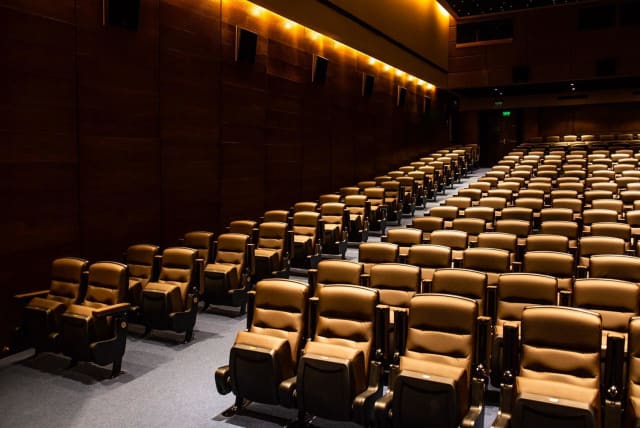
In the framework of its annual Ushpizin Poetry and Song Festival, running throughout Sukkot, Confederation House is set to dedicate the evening of October 22 to a collection of works by Spanish poet Federico Garcia Lorca in a recently released Hebrew translation by Tal Nitzan. Poets Rafi Weichert and Gilad Meiri will also participate in On Duende, Flamenco, and Bullfighting: A Tribute to Lorca, along with singer-songwriter Mor Karbasi, who will sing flamenco songs, accompanying herself on percussion.
Lorca can be said to be Spain’s most beloved poet and playwright. The hymn of Andalusia, “Verde Que Te Quiero Verde” (“Green, I Love You, Green”), is an excerpt from his poem “Romance Sonambulo” (“Dream Ballad”) set to music. It refers to the green-and-white flag of the southern Spanish province where Lorca was born and grew up. The poem was published in 1928 in his first book of poetry, Romancero Gitano (Gypsy Ballads). His last book of poetry, Sonetos del Amor Oscuro (Sonnets of Dark Love, 1936), was inspired by 16th-century poet and mystic San Juan de la Cruz, a Carmelite friar of converso (Jewish) origin.
The life of Federico Garcia Lorca
A close friend of Salvador Dali, Lorca belonged to The Generation of ‘27, a group of artists, mostly poets, who introduced symbolism, surrealism, and futurism into Spanish literature, who first met at the progressive Student’s Residence in Madrid in 1919.
After living in the United States for a year (his book Poeta en Nueva York was published posthumously in 1940) – where he was sent by his wealthy family to recover from the breakup of a love affair – Lorca returned to Spain in 1930 just as the socialist Second Spanish Republic was established. The following year, he was appointed director of its education ministry-sponsored student theater company, Teatro Universitario La Barraca (University Theater The Shack).
Lorca, eternally identified as playwright of the dramatic trilogy Bodas de Sangre (Blood Wedding), La Casa de Bernarda Alba, and Yerma was tragically and senselessly assassinated in August 1936 during the Spanish Civil War by right-wing militants. Along with him, socialist educator Dioscoro Galindo Gonzalez and two anarchist bullfighters were also murdered.

While Lorca openly supported many socialist ideas, he did not belong to any political party and had admirers on both sides of the political divide. It appears that his death could have been due to a rivalry between the two right-wing factions: the Spanish Confederation of the Autonomous Right and the Falangists, particularly since the latter subsequently denounced the poet’s murder in its newspaper, Unidad, under the headline “The finest poet of Imperial Spain has been assassinated.” Other reasons for his killing were likely his socialist tendencies, jealousy of his social position and popularity, and his homosexuality.
The artistic director of the Ushpizin Poetry and Song Festival is Israeli poet and writer Benjamin Shvili. He teaches at Alma College, Tel Aviv – a secular institution dedicated to Jewish studies. On his mother’s side, he is descended from a Sephardi family associated with Kabbalistic movements.
Nitzan, the translator of Lorca’s poetry, a resident of Tel Aviv, was born in Jaffa and grew up partially in Colombia and Argentina due to the diplomatic nature of her parents’ occupation. She has a BA in art history and Latin American studies and an MA in literature from the Hebrew University of Jerusalem. She began writing poems in her 20s and decided to dedicate herself professionally to translating poetry. Much of her early reading included Spanish poets such as Lorca. She is a preeminent translator of Hispanic literature and has won many awards for her more than 70 books of translations of Hispanic literary giants.
Weichert is the chief editor of the independent Keshev publishing house, which publishes original Hebrew poetry and Hebrew translations of world poetry. Raised in a Polish-speaking household in Israel, is the author of 12 volumes of poetry. He is also a literary critic and professor of Hebrew and comparative literature at the University of Haifa.
The evening’s moderator, Meiri, a poet and fiction writer, was born in Jerusalem (which features widely in his poetry) to a father of Syrian Jewish descent and a mother from Lviv (once Poland, now Ukraine), who was hidden during the Holocaust by a Christian woman. He has an MA in Hebrew literature from the Hebrew University of Jerusalem and a PhD from Tel Aviv University. Meiri is co-editor of several poetry anthologies, director of the Poetry Place in Jerusalem, and head of the new College of Literary Arts in Jerusalem.
Karbasi is a Jerusalem-born singer-songwriter currently based in Seville, born to Iranian and Moroccan parents with family roots in the Iberian Peninsula. She sings traditional songs, as well as original music; one of her projects is Ladino music. Karbasi has toured Europe, the United Kingdom, and the US, appearing with a variety of bands, as well as on her own. Her albums are Broken Wings; Rosa; The Beauty and the Sea; Daughter of the Spring; La Tsadika (The Ballad for Sol); and Ojos de Novia (Eyes of a Bride).■
To reserve tickets for On Duende, Flamenco, and Bullfighting: A Tribute to Lorca and other Confederation House Ushpizin Poetry and Song Festival events, call (02) 624-5206 or go to confederationhouse.org.
- What: On Duende, Flamenco, and Bullfighting: A Tribute to Lorca
- Who: Ushpizin Poetry and Song Festival. Poets: Tal Nitzan and Rafi Weichert. Host: Gilad Meiri. Music and song: Mor Karbasi
- Where: Confederation House, 12 Emile Botta Street
- When: October 22 at 7 p.m.
- Why: An evening dedicated to the Hebrew translation of the poetry of Spanish poet and playwright Federico Garcia Lorca, as well as flamenco music and song.
- Price: NIS 30





































































































